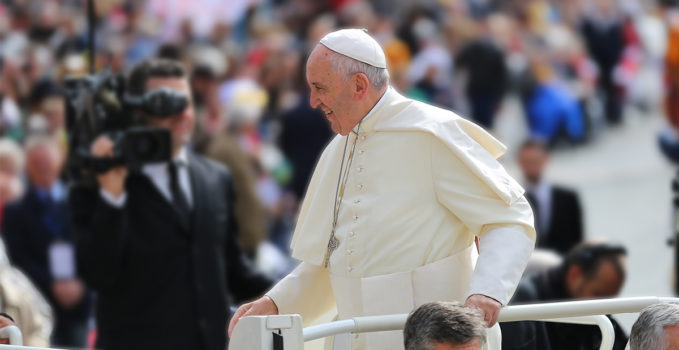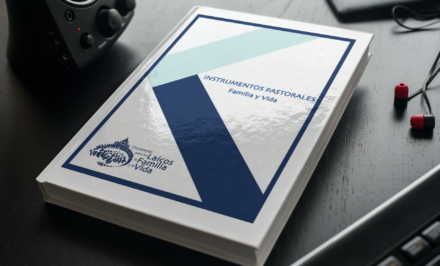A commentary on the Gaudete et Exsultate Apostolic Exhortation , by Juan Enrique Coeymans, Chile •
Pope Francis’ recent Gaudete et Exsultate Apostolic Exhortation on the call to holiness in today’s world resonates with Schoenstatt children, whose familiarity with this topic is taken for granted, and sometimes even forgotten.—

Gaudete et exsultate
Disproving the comments of many ill-informed journalists who say that Pope Benedict was very intellectual and that Pope Francis has little theological formation, the first thing that draws our attention is precisely the theological, biblical and patristic depth of the text that the Holy Father has given us. It contains 125 references from the bible, the saints and the Church Fathers in a 40-page text. It is an interweaving of references that enriches the Holy Father’s thinking, without failing to ground the theological content, in his desire, which is very logical, for people to see the application of the texts to their lives.
The reflection that I wanted to share follows the 5 chapters making up the exhortation.
The call to holiness and Personal Ideal
The first chapter is entitled “The call to holiness”, which calls to mind what became absolutely clear after the Second Vatican Council, that all Christians are called to holiness. What make this chaper interesting is that Pope Francis insists in several places on the need for each person to be holy according to God’s wishes, which is unique and special for each person. This is the topic of Personal Ideal that our father and founder Joseph Kentenich developed in our spirituality, and which we sometimes fail to give it the importance it merits in the Schoenstatt Family. On this topic, Pope Francis says: “This should excite and encourage us to give our all and to embrace that unique plan that God willed for each of us from eternity: “Before I formed you in the womb I knew you, and before you were born I consecrated you” (Jer 1:5).”
It is important to emphasize that this Personal Ideal (the Holy Father does not call it this), should not only consist of an idea of being but also an ideal of mission. One is called to be something for a particular task, for a mission. Holiness is to be for God and each other, not for one’s self. The Pope says: “Each saint is a mission, planned by the Father to reflect and embody, at a specific moment in history, a certain aspect of the Gospel.”
The enemies of holiness and mechanistic thinking
The second chapter refers to “Two subtle enemies of holiness.”These are gnosticism and pelagianism. With respect to gnosticism (this is not the same as what is currently defined as agnosticism, which refers to those who neither deny nor confirm the existence of God), which is an arrogant attempt to want to understand everything and to ignore the doctrine of mystery, the Pope says this leads to arrogance, which disembodies the faith, thereby preferring a “a God without Christ, a Christ without the Church, a Church without her people. “It over emphasizes the value of intellectualism, reducing the faith to a doctrine. Agnosticism by its very nature wants to tame the mystery, both the mystery of God and his grace, as well as the mystery of the life of others.
Pelagianism on the other hand, is an old heresy that holds that it is not knowledge that makes us holy or better, but the life we lead, but denies the existence of original sin and the need for grace and believes that it is possible to be saved by works, with the deeds and actions we undertake. It is the primacy of the will, but a will without humility.
Behind these dangers, in the background, is the danger of mechanistic thinking, which our founder warns us about: it is not just thinking, just acting, or just loving; everything must be integrated, but this through the pure mercy of God, and as free gift from him rather than personal merit.
Transformation in Christ
The third chapter entitled “In the light of the Master,” states that holiness is thinking, acting and loving like Christ. In our Schoenstatt vocabulary, this is transformation in Christ, one of the three special graces we receive in our shrines.
Jesus explained how to be saints with simplicity and through the Beatitudes. This is the longest chapter of the Exhortation, and is entirely dedicated to a calm and very grounded meditation on each of the Beatitudes. Reading them slowly calms the heart and the Word of God penetrates with emotion into the heart when one reads their descriptions.
The Holy Father comments on the false belief that works alone will lead us to live out the beatitudes, or that only closeness with God, which is of course necessary, is the only thing that matters. Prayer should spur us into action, and action should enrich our intimate and personal relationship with the Lord. Neither activism nor angelic tendencies are the way to Christian holiness.
We’ll not get to heaven alone
The fourth chapter is entitled “Signs of holiness in today’s world.” From the framework of the Beatitudes, the Pope wants to focus on several spiritual expressions that should not be lacking today to understand the lifestyle that the Lord calls us to in our times.
Among them, he emphasizes being firm and centered around God who loves and holds us. This is the doctrine of the pendulum that our father and founder spoke about and which Fr. Hernán Alessandri repeated frequently. Secondly, he recommends joy and good humour, a very common characteristic among the inpiring saints such as Thomas Moore, Vincent de Paul and Felipe Neri. I would add, without surpassing the Church’s judgement, something very unique to Fr. Kentenich. He had a famous expression which could be translated as: “To canonize a saint, I would only look whether in his life, his joy was heroic.” At the heart of it, joy is the clearest sign of authentic spiritual childlikeness.
Similarly, the Holy Father recommends audacity and fervour, echoing Christ’s words: “I will be with you always, even until the end of the world.” He is with us, we should not be afraid to face difficulties and to do what God asks of us.
Fourthly, he urges us to live and grow together in faith. We’ll not get to heaven alone, something that our father and founder also reminded us of. He ends with a fifth recommendation: constant prayer. Not only with words, but with small, simple moments in the midst of our daily busyness, addressing God with an ejaculatory prayer or a simple thought. This is a characteristic of workday sanctity.
Combat, vigilance, discernment and practical faith in Divine Providence
Finally, in the fifth chapter entitled “Spiritual combat, vigilance and discernment”, he reminds everyone, but it resonates especially with our founder’s children, of the need for practical faith in Divine Providence: to be attentive to what the Lord is saying to us through circumstances and in our heart, and it should always be contrasted with the order of being. There is no holiness, without discerning God’s will. This is why, in the formation of our Schoenstatt members, the teaching on practical faith in Divine Providence should occupy a far more relevant position than it has currently, in order to understand and live our covenant with the Blessed Mother in daily life. Without practical faith, we will end up doing what we want and not what God wants.
Every Schoenstatt child should meditate on it, savour it and apply it to themselves
I think this exhortation is one of the most beautiful letters that have been written in the Church since the Second Vatican Council. And every Schoenstatt child should meditate on it, savour it, and apply it to themselves, because our world – almost entirely – from workday sanctity and the experience of the covenant of love has been described by the Holy Father. We feel at home with Pope Francis’ words to us and we can understand that the task that the Chilean and universal Church have is to overcome the crisis of our times with greater holiness, greater love, and more silence. Crisis of holiness, crisis of love, crisis of silence and deep prayer is what faces us and this exhortation touches our hearts in order to respond to these crises.
Complete text of the Gaudete et Exsultate Apostolic exhortation
Source: Vínculo Magazine, Chile
Original: Spanish, 9 July. Translation: Sarah-Leah Pimentel, Cape Town, South Africa














